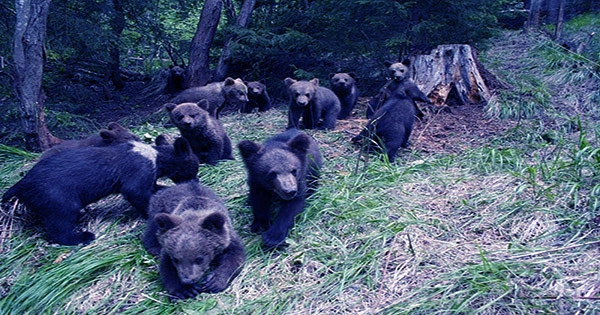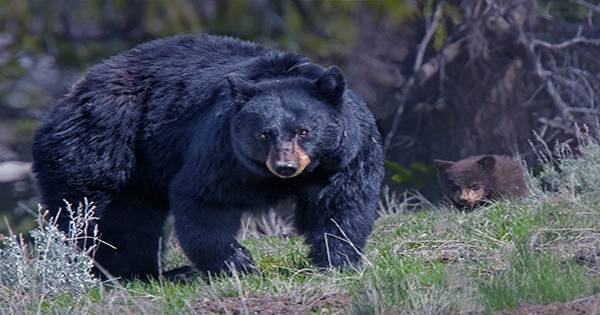It was a spectacle that brought traffic to a halt. On a meandering wooded road in central Romania, a brown bear appears to be sleeping, its head on its paws, with some paper napkins by its side.
“It’s amazing,” Mike, an Israeli visitor of 72 years old, stated. “I thought it might be dead.”
But the bear was only resting after a sandwich, one of many thrown by tourists going through Transylvania in order to capture a memorable holiday photo.
Attacks on brown bears are on the increase in Romania, which has Europe’s largest brown bear population outside of Russia, as the bears travel out of the forests in search of food, which is sometimes brought by visitors or left in unsecured garbage cans.
The issue is putting herders and farmers against conservationists, with authorities increasing the number of bears that can be slaughtered by 50 percent this year to 220. Some MPs want that figure to be doubled.

Those advocating for increased quotas portray bears as a menace and claim their numbers are increasing, with the Environment Ministry estimating an 8,000-strong population.
However, experts argue that obsolete and faulty methods are being used to count the species protected by an EU directive in order to ensure their protection.
The results of a DNA-based census to ensure roaming bears are not counted several times are still awaited.
Conservationists contend that rather than killing the creatures, it is possible to better manage human-bear conflict.
“Not romantic at all”
However, numerous villagers in the Carpathian Mountains told AFP that increased bear sightings were concerning.
According to government estimates, fourteen people were killed and 158 were injured in attacks between 2016 and 2021.
Tibor Fekete, a herder who cares for 70 cows in alpine pastures near the road to Lake Saint Anne, wants bears shot. This year, he claims, they slaughtered three of his cows.
“Bears cause damage and endanger our lives,” said the 40-year-old, who lamented the expense of keeping six dogs to defend the herd.
A bear also entered a schoolyard in Miercurea Ciuc, 30 kilometers (20 miles) away, and climbed a tree last month.
An intervention team killed the animal rather than chasing it away or tranquilizing it, claiming to be protecting the school’s 1,700-plus students.
Bears can still attack when tranquilized, according to Miercurea Ciuc mayor Attila Korodi, a three-time environment minister and proponent of further culling. “And who takes responsibility when someone is hurt?”
He said that more bears had been chased off the town’s streets this year than the previous year.
“I think Europe sees Romania not only as some sort of a sanctuary but as a museum where everything must stay as it is,” he told AFP.
“Day-to-day life with bears is not romantic at all,” he went on to say.
Bear trophy hunting has been prohibited in Romania since 2016, and only “specialized technical personnel” are permitted to shoot the animals.
Lawmakers, led by Barna Tanczos, a former environment minister and supporter of bear culling, have introduced legislation that would legalize the death of approximately 500 bears per year.
Otherwise, bears would wind up wandering lowland places like Bucharest, or “bathing in the Danube Delta,” according to Tanczos.
Conservationists are skeptical of his assertions, fearing that ever-increasing quotas may open the door to trophy hunting.
According to reports, bears that create no issue are being shot.
‘Bear-smart community’
Baile Tusnad, a little touristy mountain hamlet near Miercurea Ciuc, is attempting to become a “bear-smart community.”
“We must understand that bears will not disappear from this area.” But if the bear doesn’t feel safe, it won’t stay in town,” Istvan Imecs, a 36-year-old zoologist, told AFP.
He was critical of tourists, both foreigners and Romanians, who fed bears, which is banned.
With the help of Imecs and conservation organizations such as WWF, the municipality is testing bear-proof garbage cans and has placed 400 electric fences around residences and bins.
There is also an app that explains how to prevent conflict with the animals.
The town had a decline in damage reports from 50 in 2021 to zero in 2022 and 2023.
Laci, a local who only revealed his first name, put up an electric fence years ago.
“Anyone in Tusnad who says he’s not scared of bears is either a liar or stupid,” the 47-year-old remarked.
“We just grew accustomed to living together.” There is no other option.”
















